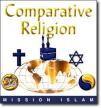 Universal Life Church By Rev. Scott Randall Bobbitt
Universal Life Church By Rev. Scott Randall BobbittHaving previously taken Comparative Religion as a college undergraduate, I took this course, not only because it is part of the core curriculum, but also to serve as a review. It has been almost thirty years since I originally took Comparative Religion, and even though I read and studied continuously during the intervening time, I hoped that this course would be such that I could relearn important details I have forgotten, in addition to learning new information that I missed the first time around. I have not been disappointed! Comparative Religion, by Reverend Kythera Ann has turned out to be all that I hoped for and more.
This course covered the vast subject matter of comparative religion in an extremely complete and coherent manner. It has brought together an interesting combination of basic, standard material that is expected to be in a comparative religion course, with more obscure information that was skillfully used to give a more complete picture of the similarities and differences of not just the major religions, but less well known religions as well. Instead of only covering the important beliefs and characteristics of major religions one by one, leaving the student to sort out the similarities and differences for themselves as many comparative religion college courses do, this course is written with emphasis on the similarities in particular.
It was shown that the similarities are not necessarily in matching details. That is to say that most, if not all, religions have a similarity of common elements such as symbolism, prayer, ceremony, sacred space and architecture, sacred literature, divine messengers, and beliefs about suffering and death, even though the specific details of these elements may differ from one religion to the next.
There are several aspects of the course that I have particularly enjoyed. Reverend Kythera Ann has been very careful to define the many religious and theological words that are encountered in a study like this. Not only has the terminology been clearly and fully defined, but all terms are put into context to give a more complete understanding of their meaning. I really like having all these definitions together in one collection for ease of reference.
I also liked the extended discourses on Esoteric Traditions and, Sacred Space and Architecture. Both subjects are covered in depth, and provided me with a far greater understanding of these subjects than I previously possessed. There is a another part of each discourse that was very helpful; which is, the suggested websites listed at the end of each lecture. I did go to these websites, and I was often surprised at what I found. The websites concerning esoteric organizations in Discourse 8 (Rosicrucian, Freemasonry) were especially interesting.
I did not encounter anything in particular about the course that I disliked. Having seen one perspective from the other comparative religion college course I took, Reverend Kythera Ann has a different take on the subject that I really enjoyed. As someone who has studied most of the sacred literature in the original recommended resources list in Discourse 1, and was already familiar with the basic beliefs of many religions, the added lesser known information throughout the course was very refreshing. Someone taking this course without a solid, basic, world religions background would still get a wealth of information and comparative details, but would not necessarily develop a deeper understanding of each religion without reading some variety of sacred texts. Then again, I suppose interested students could take courses on the individual religions to get that.
Personally, I enjoyed the format (distance learning on the internet) and the content very much. Thank you very much for making well-written and illustrated, relevant courses written by knowledgeable individuals such as Reverend Kythera Ann, available to us! I look forward to my next seminary course with enthusiasm.
Blessed be,
Scott
*******************************
The Universal Life Church is a comprehensive online seminary where we have classes in Christianity, Wicca, Paganism, two courses in Metaphysics and much more. I have been a proud member of the ULC for many years and the Seminary since its inception.
The Universal Life Church offers hand-fasting ceremonies, funeral ceremonies and free minister training.
As a long time member of ULC, Rev. Long created the seminary site to help train our ministers. We also have a huge selection of Universal Life Church minister supplies. Since being ordained with the Universal Life Church for so many years and it's Seminary since the beginning, I've watch the huge change and growth that has continued to happen.
Try our new free toolbar at: ULC Toolbar






No comments:
Post a Comment